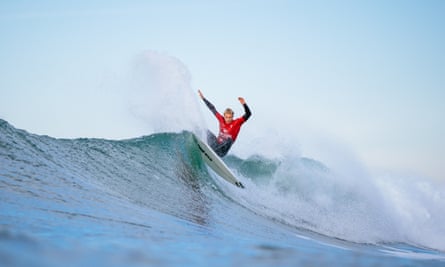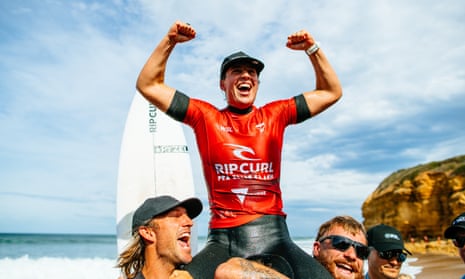Two-time world champion Tyler Wright has made it third time lucky at Bells Beach after busting through the pain barrier to finally win the iconic World Surf League event.
Wright lost the Bells Beach final to Carissa Moore in both 2013 and 2014 but the 28-year-old Australian got her revenge on Sunday, beating Moore 16.93 to 10.57 in a dominant performance that featured rides of 8.93 and 8.00.
Wright was brimming with joy as she caught a wave in to celebrate the win, and was chaired out of the ocean by her brothers Owen and Mikey Wright.
“Honestly this is a dream come true,” Wright told the WSL broadcast. “There’s been so many times I wanted to give up on getting back to this sort of form. It’s taken all of me. It’s unbelievable.”
Sunday’s Rip Curl Pro victory was her first title on the World Surf League tour since the Maui Pro at Pipeline in 2021.
“I cannot put into words what this means,” she said. “It’s more than a win. It’s the only event I’ve ever wanted to win. I’m over the moon, I’m stoked.
“Two years being out is a long time. That fire that kind of got snuffed out by illness has been re-lit. “It’s been a long time since I’ve felt like I’ve surfed like myself.”
Just making it to the final was no easy feat for Wright. She edged past three-time Bells winner Courtney Conlogue 14.23 to 13.90 in a tense semi-final showdown.
Wright trailed Conlogue with seven minutes remaining in the heat, needing a 7.01 ride to retake the lead. The Australian produced the goods when it mattered most, attacking a wave with intensity to secure a 7.33.
But the effort required to claw her way back took its toll on Wright, who was left in pain and needed to take some time out after the heat to recuperate.
Wright missed half of 2018 and almost all of 2019 after being struck down by an illness that was later diagnosed as post-viral syndrome, and she is aware that pushing her body too hard can take its toll.

“I call it the edge. It’s essentially when my heart rate and my fight or flight gets so peaked so quickly,” Wright said. “Essentially my ovaries start to cramp up and everything in me is just pain.
“That heart-rate spike was pretty hectic [today] due to how I had to surf back into the heat. At the end there my ovaries there were pretty killer, and I had to take a minute to walk it out for sure.
Wright thanked the people who supported her through her health challenges.
“I feel incredibly lucky for everyone that I have around me and also the people that have helped me work this hard to get back,” she said.
“It’s not easy to rebuild after two years out of the water. Building back takes a lot of patience and a lot of trust and rebuilding trust in myself to manage this sort of stuff again.”
Meanwhile, Ethan Ewing’s hopes of emulating his mother by winning Bells Beach were cruelly denied by Brazilian Filipe Toledo.
Ewing, whose late mother Helen Lambert won the 1983 Bells Beach title, soared into the semi-finals after posting an impressive quarter-final win over Olympic bronze medallist Owen Wright on Saturday. But his 35-minute semi-final against Toledo on Sunday was blighted by a lack of surfable waves.
Ewing’s first scoring wave did not come until there was just six minutes remaining and it was too small to do any major damage. Toledo went on to defeat another Australian, rookie Callum Robson, in the final and heads to the Margaret River Pro as the new world No 1.
